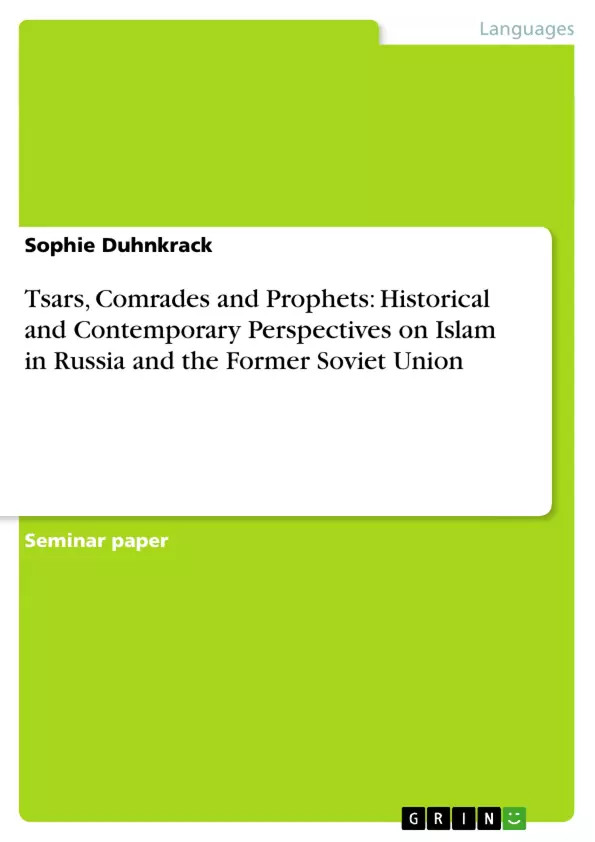For almost a millennium Russia has interacted with Islam. After the collapse of the Soviet Union, Islam has had a considerable impact on the formation of a new Russian identity. The “ideological and cultural vacuum” generated by the enormous political change hampers the creation of this identity. In the new liberty, formerly excluded and suppressed minorities strive for self-determination and recognition of their rights. The following study briefly depicts the new political situation. Further it analyzes the policies of the post-Soviet Russian Federation government and its consequences for Russian Muslims; it compares them with the policies of the Central Asian state of Uzbekistan. Using Turkey as a specific example, conclusions are drawn about the effects of this new socio-political climate on Russian Muslims.
Inhaltsverzeichnis (Table of Contents)
- The Post-Soviet Period
- Islam in Russia: A New Political Situation
- The Rise of Nationalism and Inter-Ethnic Conflicts
- The Chechen War and the Rise of Islamic Extremism
- Putin's Recentralization Policy and its Impact on Muslim Minorities
- Reactions of Muslim Republics to Putin's Policy
Zielsetzung und Themenschwerpunkte (Objectives and Key Themes)
This paper examines the impact of Islam on the formation of a new Russian identity in the post-Soviet period. It analyzes the political policies of the Russian Federation and its consequences for Russian Muslims, comparing them to the policies of Uzbekistan. The paper uses Turkey as a specific example to draw conclusions about the effects of the new socio-political climate on Russian Muslims. Key themes include:- The impact of the collapse of the Soviet Union on the political and social landscape of Russia
- The rise of nationalism and inter-ethnic conflicts in the post-Soviet period
- The role of Islam in the Chechen War and its impact on Russian politics
- The consequences of Putin's recentralization policy for Muslim minorities in Russia
- The diverse reactions of Muslim republics to Putin's policies
Zusammenfassung der Kapitel (Chapter Summaries)
- The Post-Soviet Period: This section introduces the new political situation in Russia after the collapse of the Soviet Union, focusing on the emergence of new identities and the striving for self-determination by formerly suppressed minorities. It highlights the economic and social challenges faced by Russian Muslims, including their limited recognition as equal citizens.
- The Rise of Nationalism and Inter-Ethnic Conflicts: This section delves into the initial liberal policies of Yeltsin, which encouraged nationalist sentiments and led to concessions for non-Russian ethnic groups. It discusses how the subsequent attempt to recover federal power through various approaches, including power-sharing agreements, fueled inter-ethnic conflicts and furthered independence aspirations.
- The Chechen War and the Rise of Islamic Extremism: This section focuses on the Chechen War as a consequence of Chechnya's refusal to sign the Federation Treaty. It examines the role of Islam in Chechen internal politics and its development into a unifying force against the federal government. It also explores the link between the Chechen War and the rise of Islamic extremism in the region.
- Putin's Recentralization Policy and its Impact on Muslim Minorities: This section analyzes Putin's approach to the Muslim republics, focusing on his aim to restore federal power and curtail the power of regional elites. It examines the consequences of this policy for Muslim minorities, including limited political participation and societal rejection.
- Reactions of Muslim Republics to Putin's Policy: This section explores the diverse reactions of Muslim republics to Putin's recentralization policy. It discusses the response of various republics, including Bashkortostan, Tatarstan, and Chechnya, highlighting the mobilization of national sentiment and the rise of guerrilla insurgency in Chechnya.
Schlüsselwörter (Keywords)
Key themes and concepts explored in this paper include the formation of a new Russian identity, the role of Islam in the post-Soviet period, the political policies of the Russian Federation, nationalism, inter-ethnic conflicts, the Chechen War, Islamic extremism, Putin's recentralization policy, and the diverse reactions of Muslim republics.Frequently Asked Questions
How did the collapse of the Soviet Union affect Islam in Russia?
The collapse created an ideological vacuum, allowing Islam to re-emerge as a significant factor in the formation of new national and ethnic identities among Russia's minorities.
What was Putin's recentralization policy?
Putin aimed to restore federal power by curtailing the autonomy of regional elites and bringing the Muslim-majority republics under tighter control from Moscow.
What role did Islam play in the Chechen War?
Islam evolved from a cultural identity into a unifying political force and, in some factions, a radical ideology used to mobilize resistance against the Russian federal government.
How do Russian and Uzbek policies on Islam compare?
While both states seek to control religious extremism, Uzbekistan has historically employed more stringent state control over religious institutions compared to the federal structure of Russia.
What is the 'ideological vacuum' mentioned in the study?
It refers to the disappearance of Communist ideology after 1991, which left citizens searching for new foundations for their identity, often finding them in religion or nationalism.
- Quote paper
- Sophie Duhnkrack (Author), 2009, Tsars, Comrades and Prophets: Historical and Contemporary Perspectives on Islam in Russia and the Former Soviet Union, Munich, GRIN Verlag, https://www.grin.com/document/127504



